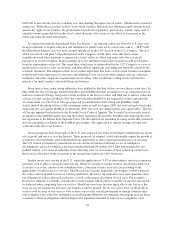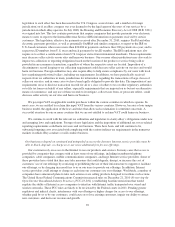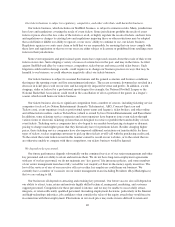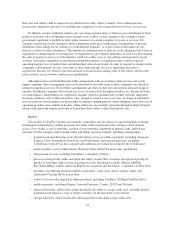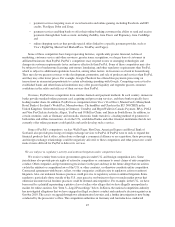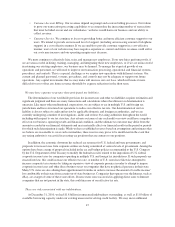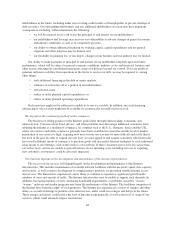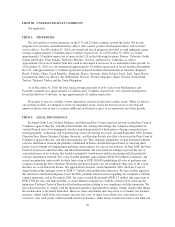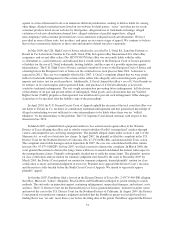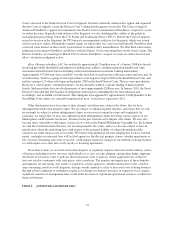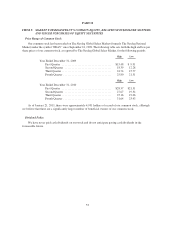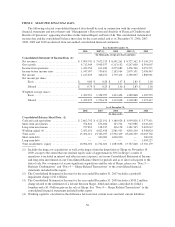eBay 2010 Annual Report Download - page 53
Download and view the complete annual report
Please find page 53 of the 2010 eBay annual report below. You can navigate through the pages in the report by either clicking on the pages listed below, or by using the keyword search tool below to find specific information within the annual report.indebtedness in the future, including under our revolving credit facility or through public or private offerings of
debt securities. Our outstanding indebtedness and any additional indebtedness we incur may have important
consequences, including, without limitation, the following:
• we will be required to use cash to pay the principal of and interest on our indebtedness;
• our indebtedness and leverage may increase our vulnerability to adverse changes in general economic
and industry conditions, as well as to competitive pressure;
• our ability to obtain additional financing for working capital, capital expenditures and for general
corporate and other purposes may be limited; and
• our flexibility in planning for, or reacting to, changes in our business and our industry may be limited.
Our ability to make payments of principal of and interest on our indebtedness depends upon our future
performance, which will be subject to general economic conditions, industry cycles and financial, business and
other factors affecting our consolidated operations, many of which are beyond our control. If we are unable to
generate sufficient cash flow from operations in the future to service our debt, we may be required to, among
other things:
• seek additional financing in the debt or equity markets;
• refinance or restructure all or a portion of our indebtedness;
• sell selected assets;
• reduce or delay planned capital expenditures; or
• reduce or delay planned operating expenditures.
Such measures might not be sufficient to enable us to service our debt. In addition, any such financing,
refinancing or sale of assets might not be available on economically favorable terms or at all.
We depend on the continued growth of online commerce.
The business of selling goods over the Internet, particularly through online trading, is dynamic and
relatively new. Concerns about fraud, privacy, and other problems may discourage additional consumers from
adopting the Internet as a medium of commerce. In countries such as the U.S., Germany, Korea and the U.K.,
where our services and online commerce generally have been available for some time and the level of market
penetration of our services is high, acquiring new users for our services may be more difficult and costly than it
has been in the past. In order to expand our user base, we must appeal to and acquire consumers who historically
have used traditional means of commerce to purchase goods and may prefer Internet analogues to such traditional
retail means to our offerings, such as the retailer’s own website. If these consumers prove to be less active than
our earlier users, and we are unable to gain efficiencies in our operating costs, including our cost of acquiring
new customers, our business could be adversely impacted.
Our business depends on the development and maintenance of the Internet infrastructure.
The success of our services will depend largely on the development and maintenance of the Internet
infrastructure. This includes maintenance of a reliable network backbone with the necessary speed, data capacity,
and security, as well as timely development of complementary products, for providing reliable Internet access
and services. The Internet has experienced, and is likely to continue to experience, significant growth in the
numbers of users and amount of traffic. The Internet infrastructure may be unable to support such demands. In
addition, increasing numbers of users, increasing bandwidth requirements, or problems caused by “viruses,”
“worms,” malware and similar programs may harm the performance of the Internet. The backbone computers of
the Internet have been the targets of such programs. The Internet has experienced a variety of outages and other
delays as a result of damage to portions of its infrastructure, and it could face outages and delays in the future.
These outages and delays could reduce the level of Internet usage generally as well as the level of usage of our
services, which could adversely impact our business.
48


